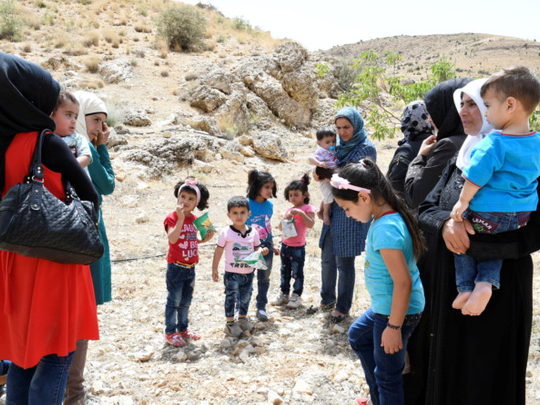
Washington: US President Donald Trump’s administration is increasing aid to Lebanon by more than $140 million to support Syrian refugees in the country, a move aimed at countering Hezbollah’s influence and supporting an ally threatened by the civil war next door.
The aid was announced by the State Department as Lebanese Prime Minister Saad Hariri visited the White House on Tuesday. The money will go towards food, shelter, emergency medical care and immunisations in a country with the world’s largest per capita refugee population, about 1.5 million displaced people, according to international data compiled by the administration.
The US has provided more than $1.5 billion to Lebanon since the start of the Syrian crisis in 2011.
Trump in a White House news conference with Hariri on Tuesday said that Lebanon had “led the way” in accepting an outsized proportion of Syrians displaced by the conflict in their country.
“I want to commend you and your people for standing up for humanity in a very troubled part of the world,” Trump told the Lebanese leader.
Syrian refugees now account for more than two-thirds of Lebanon’s total refugee population, along with 18,000 refugees from Iraq and 452,000 long-time Palestinian refugees. Lebanon began tightening restrictions on refugees from Syria in 2015 as it struggled to manage the influx.
Earlier this year, Hariri said Lebanon was close to “breaking point” due to the strains of hosting 1.5 million Syrian refugees, and he feared unrest could spiral from tensions between them and Lebanese communities.
Refugees who fled the six-year-long conflict in neighbouring Syria make up a quarter of Lebanon’s population, and most live in severe poverty in makeshift camps across the country as the government opposes the creation of formal ones.
“Today if you go around most of the host communities, there is a huge tension between the Lebanese and the Syrians ... I fear civil unrest,” Hariri said.
Since his declaration, he has urged the international community to boost financial support for Lebanon.
Hariri said the country has been “extremely lucky in making sure this crisis has not affected host communities, but we have stretched our luck”.
The Syria war has weakened Lebanon’s economy, fuelled tension among Lebanese allied to the rival sides, and triggered a number of terrorist attacks. But there has so far been no significant violence between Syrian refugees and Lebanese host communities.
Hariri urged the international community to commit to spending the equivalent of $10-12,000 per refugee over a period of five to seven years, compared to the current level of foreign support equivalent to $1-1,200 per year.
“I think that will make sure that Lebanon is going to stand on its own and the economy will thrive,” he said.
Georges Ghali, programme manager at Lebanese human rights organisation ALEF, said the tensions were rooted in factors such as misperceptions held by Lebanese that refugees were being showered in aid, and government policies that had made it difficult for them to obtain official residency.
Tensions had not reached the point of violent escalation, Ghali added.
Lebanese officials, citing World Bank figures, say the cumulative cost of the Syrian conflict to Lebanon was $18.15 billion to the end of 2015.
Lebanon’s annual economic growth has slowed to just over one per cent from an average of 8 per cent before the Syrian war, officials have said.
The government is seeking financial support for a programme of public sector-led investment in infrastructure to boost the economy, and to increase the number of Syrians in education.












